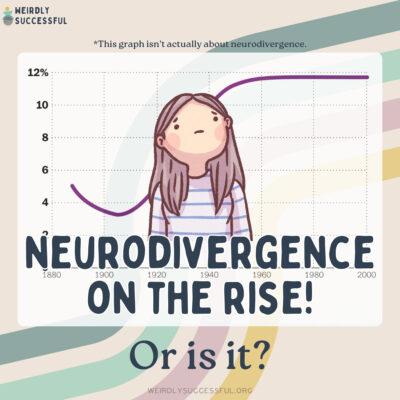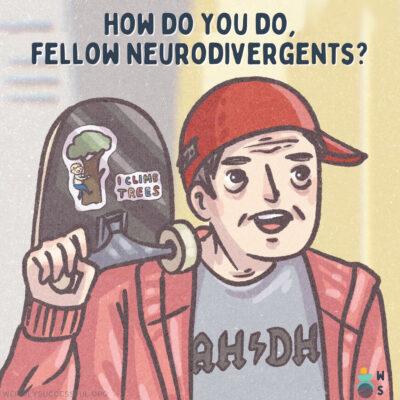ADHD (Attention Deficit Hyperactivity Disorder) is a lifelong, hereditary1 neurological condition.
A person with ADHD can be inattentive and hyperactive-impulsive in their internal mental processes as well as their outward presentation, from speech to behaviour patterns. They can also be a combined subtype with characteristics from both sets.
D as in Disclaimer
In many medical acronyms, the D stands for Disorder, Deficit or Dysfunction. Please note that even when we refer to the condition using the medical name, we don’t subscribe to the deficit-focused view of neurodivergence.
We encourage you to describe your condition as it feels most accurate to you, whether it’s Difference, Difficulty, Disability, or something else.
The names of ADHD
ADHD has an infamous misnomer, as even the current descriptor is not accurate to the condition.
- There is no attention deficit, but rather an interest-based cognition, as ADHDers have plenty of attention when a task is stimulating enough (just think of hyperfocus).
- Hyperactivity is also just one of the subtypes, and not every ADHDer presents hyperactive traits.
- Thirdly, ADHD is not a disorder but a condition, as the consensus moves more and more toward neurovariety. Neurovariety means that neurodivergent conditions are not illnesses that need to be cured, but naturally existing variations of the human brain.
How the names and understanding of ADHD evolved
- 1798 — Mental restlessness
- 1930s — Minimal brain damage
- 1960s — Minimal brain dysfunction
- 1968 — Hyperkinetic reaction of childhood
- 1980 — Attention-deficit disorder (ADD). This is still a version that some people use, even though it’s been officially changed since 1987.
- 1987 — Attention-deficit/hyperactivity disorder (ADHD) (1987)
- 1994 — ADHD with 3 subtypes: hyperactive-impulsive, inattentive and a combined subtype
- 2013 — ADHD with 3 symptom presentations, with the understanding that an individual can shift through the three presentations and the symptoms can present differently at different stages of their life. 2
Articles about ADHD
Related terms
executive dysfunction
Executive functions are essential, they help us make plans, stay organized, pay attention, and keep our emotions in check. It plays a big role in making decisions and adapting to new situations.
Executive dysfunction can happen when these processes have a difference or impairment that affects everyday life.
body doubling
Body doubling means doing a task or errand with someone else or in the presence of someone else so it’s easier to start or follow through.
Their supportive presence helps create a safe, anchoring environment that makes it easier to start and follow through with tasks — without pressure or judgment.
It is one of the strategies for managing focus and creating a flow for work, even if you feel lost and overwhelmed by executive dysfunction.
hyperfocus
Hyperfocus is a cognitive state characterized by an intense concentration and absorption in a particular task or activity to the point of excluding or neglecting other stimuli or responsibilities.
time blindness
Time blindness is when it’s tough to grasp the passing of time. It usually means you under- or overestimate the time a project will take. It makes it tricky to manage schedules, deadlines, and planning. It can lead to procrastination, forgetfulness, and feeling overwhelmed or rushed.
ADHD tax
ADHD tax is a casual term used to describe the additional costs, both tangible and intangible, that ADHD individuals often face due to their neurodivergence, especially struggles due to executive dysfunction.
ADHD paralysis
ADHD paralysis is a form of executive dysfunction.
It refers to the difficulty in initiating, continuing, or completing tasks, even when the person understands the urgency and importance, and also has the ability to do the task. ADHD paralysis can be triggered by various factors, including overwhelm, anxiety, or the perceived complexity of a task.
auditory stimming
Auditory stimming is a natural self-regulatory behavior that involves making sounds with your voice, either through non-word vocalizations (vocal stimming) or speech-based expressions (verbal stimming). This form of stimming helps with emotional regulation, sensory processing, and achieving comfort and focus.
context switching
Context switching refers to the cognitive process of shifting attention between different tasks or mental states. It involves disengaging from one task and engaging in another, requiring the brain to change its focus, rules, and objectives.
This process can be mentally taxing due to the cognitive load involved in stopping one task and starting another, shifting gears to focus on the new task, and getting accustomed to the new situation with all its stimuli. Frequent context switching and jumping from task to task can lead to a decrease in productivity and efficiency.
decision fatigue
Decision fatigue refers to the deteriorating quality of decision-making after a long period of decision-making activity. It means you feel mentally exhausted from making too many choices.
decompressing
Decompressing refers to engaging in activities or behaviours that allow a person to relax, unwind, and alleviate stress or sensory overload.
This term is particularly significant in the neurodivergent community as we often experience heightened sensitivity to environmental stimuli, leading to increased stress and anxiety levels.
Making sure to have time to decompress after especially taxing events is an essential part of self-care.
demand avoidance
Demand avoidance means you’re opposed to doing something when it’s perceived as a demand, especially coming from an authority figure, even if you want to do the thing. .
PDA stands for Pathological Demand Avoidance or Pervasive Drive for Autonomy.
Autonomy is the core value for people with PDA and any demand that threatens this autonomy triggers a danger-response (fight, flight, freeze).
emotional regulation
Emotional dysregulation refers to difficulty in effectively managing and controlling one’s emotions. It is characterized by intense, unpredictable, or seemingly disproportionate emotional responses that may be challenging to regulate or modulate.
When someone has difficulty regulating their emotions, they are easily overstimulated and they can get upset or overwhelmed easily. On the other hand, they can also have trouble with calming down, relaxing, or decompressing and it takes much effort to regulate their mood.
Emotional dysregulation can also lead to sleep difficulties. Creating helpful routines, focusing on self-compassion, and giving yourself space for unmasking and stimming can help with this process.
hyperfixation
Hyperfixation is a term often used in the context of neurodivergent individuals, particularly Autistics and ADHDers. It refers to an intense and prolonged focus on a particular subject, topic, or activity, often at the price of excluding everything else.
info dumping
Info dumping is the casual name referring to the act of sharing an extensive amount of information, usually about a subject or topic the person is extremely passionate about.
object constancy
Object constancy is the notion that you remain connected and aware of items or people even when they are not visible or physically around. Difficulties in object constancy lead to the "out of sight, out of mind" experience, which is very common with ADHD folk. Not to be confused with object permanence, which is a developmental stage in babies, and relates to them believing things genuinely stop existing when not in sight.
penguin pebbling
Penguin pebbling is a term derived from the behaviour of Adélie penguins who meticulously collect and arrange pebbles to build their nests.
In a neurodivergent context, the expression is used to describe a common neurodivergent behaviour of people collecting and giving loved items to others – "this made me think of you, I think you’ll like this, I thought this was pretty and I want you to have it".
stimming
Stimming (also known as self-stimulating) is a common sensory-seeking neurodivergent behaviour. It means stimulating yourself in a repetitive manner to self-soothe, regulate, or express excitement. Stimming is common both in ADHD and autism.
Stimming movements, however, are common in all human beings. Everybody stims, whether it’s chewing the end of a pencil while you think, swaying back and forth to the rhythm of the music while you’re standing in line, or swinging your legs when they can’t touch the ground.
transitions
Transitioning, in the context of neurodiversity, refers to the process of moving from one state, activity, or place to another. It involves a shift in attention, focus, and cognitive resources.
For neurodivergent individuals, it may require additional time, support, and strategies to manage effectively.
Transitioning can encompass a wide range of changes, from minor daily shifts like moving from one task to another, to major life changes such as transitioning from school to work or from living at home to independent living.
waiting mode
Waiting mode is a psychological state characterized by heightened anticipation or anxiety while awaiting a specific outcome or event.
In the neurodivergent, especially ADHD community it usually means the period before an event that needs focus or attention spent in a sort of paralysing waiting mode, not being able to do little else until the event is over.
working memory
Working memory is one of the executive functions. It is our mental scratchpad, where we temporarily hold and play with info to help with tasks like problem-solving and learning. It’s key for everyday stuff but has limited space, so juggling too much can be tough, especially for people with ADHD, who have an even more …







